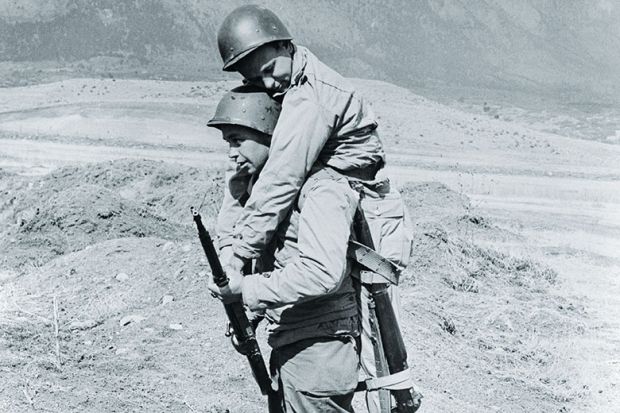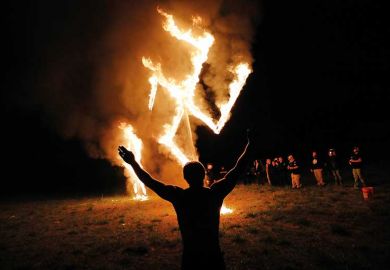Total Mobilization traces the US’ changing relationship to the Second World War through the memorialisation of the character of the soldier in film and literature. Tied to it is the masking of America’s “global hegemony” developed since that war, and the violence and consumer capitalism at its heart.
Roy Scranton begins with the myth of the soldier as trauma hero and his “blood sacrifice”, influenced by Christian martyrdom. Because of the suffering he experiences while soldiering, the trauma hero is cleansed of guilt. He – and by extension the country that sends him to war – is not morally accountable for the harm inflicted on combatants and non-combatants. The author gives numerous literary examples about the Second World War to illustrate this. There is the “aestheticized sacrifice of the community’s appointed killer”, embodied by the bomber pilot who kills while fearing for his life (Joseph Heller’s Catch-22). There is the racism, both during the war and after, suffered by the African American soldier (Ralph Ellison’s Flying Home). And there is the growing self-awareness and alienation of the individual soldier reduced to a cog in the wheel of the military industrial complex (William Wyler’s film The Best Years of Our Lives). These texts also expose the fissures in another dominant myth – the undivided nation during a time of “total mobilization” – and reveal additional kinds of suffering that become part of the sacralisation of trauma.
As a counterweight to this, Scranton discusses James Jones, Wallace Stevens and James Dickey’s work for the “awareness of the soldier’s agency and objective participation in collective violence, which thus precludes the dynamic of victimization and scapegoating central to the myth of the trauma hero”. He rejects the role of the suffering solider as seer, the holder of insight into the human condition, what James Campbell calls “combat gnosis”. The trauma hero’s supposed hard-won knowledge is for Scranton proof of the policy of distraction encouraged by the “terror engine of American exceptionalism”.
I find this reduction of the soldier/character to perpetrator, to political tool, facile. The soldier/character can express both the trauma of combat and the moral vertigo of being an agent of larger political forces. In his zeal to expose the moral decrepitude at the heart of America’s appetite for violence and capitalism, Scranton too easily dismisses the real pain of war, calling out the “pseudoscientific language of trauma and recovery”. Yet as so much recent medical research has shown, trauma exists, despite the limitations of language. This does not make the experience any less real.
Still, there is great relevance in Scranton’s intention of seeing how meaning is made in America’s relationship to its wars and firearms, in its relationship to non-white, non-Christian populations, seeing that these relationships are roiled with prejudice and self-righteousness today, just as they have been for centuries. By analysing the representation of the soldier in American literature, and by paying attention to authors who work against the trauma hero, Scranton shows the “collective practices” that have emerged as a result of wars, as well as the fractured nature of American society. These are critically important insights for coming to terms with the responsibility of such a powerful and dangerous machine as the American military.
Miryam Sivan is a lecturer in literature and writing at the University of Haifa, Israel. She recently published a novel, Make It Concrete, about a ghostwriter of Holocaust memoirs.
Total Mobilization: World War II and American Literature
By Roy Scranton
University of Chicago Press, 288pp, £62.00 and £22.00
ISBN 9780226637280 and 9780226637310
Published 20 September 2019
Register to continue
Why register?
- Registration is free and only takes a moment
- Once registered, you can read 3 articles a month
- Sign up for our newsletter
Subscribe
Or subscribe for unlimited access to:
- Unlimited access to news, views, insights & reviews
- Digital editions
- Digital access to THE’s university and college rankings analysis
Already registered or a current subscriber?







